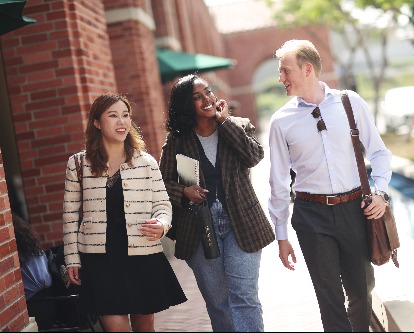On April 4, USC Marshall School of Business hosted a dynamic panel discussion featuring senior executives from its Corporate Advisory Board, offering students a rare opportunity to engage directly with top leaders from some of the most influential companies in the world. The event brought career guidance, life lessons, and leadership insights to Marshall and Leventhal undergraduate students preparing to enter today’s fast-evolving job market.
Comprised of senior executives from leading global companies, the Corporate Advisory Board supports Marshall’s strategic direction and strengthens its connection to the global business community.
The panel, “Real Talk: Insights from Industry Leaders” was moderated by Benjamin Ola Akande, PhD, senior vice president and chief corporate responsibility officer at Stifel, who set the tone for an open, honest, and often humorous conversation. He was joined by Tolian Gjinka, partner at McKinsey & Company, Brian Glaser, vice president and chief talent and learning officer at Google, Estela Wolf Levin, SVP and general manager at American Funds Service Group and Capital Group.
Connection and Authenticity
Panelists reflected on their journeys to senior leadership, offering students a mix of practical tips and powerful storytelling. A recurring theme was the importance of building relationships — both personal and professional — and how early investments in leadership, curiosity, and networking can shape long-term success.
Levin, a USC alumnae, juggled part-time work in finance with a full course load during her undergraduate years.
“For me, the social experience was secondary, almost like tertiary,” Levin said. “It wasn’t until my mid-twenties that I looked up and realized I don’t have the broad social friendship network that a lot of my other friends and colleagues and people that I’m meeting do from college. So, I doubled down on that in grad school, and I went all in.”
For Glaser, standing out in a competitive hiring process comes down to asking smarter questions.
“If you can Google the question, don’t ask it,” he advised. “When someone asks me something that shows they’ve thought about the challenges I’m facing, even if they don’t know me, it signals they might be able to help solve real problems.”
Gjinka emphasized practice and composure as keys to the interview success. Confidence, he said, is earned through repetition.
“Even if you’re not naturally confident, if you’ve done 50 mock interviews, it shows,” Gjinka said. “That polish comes through fast. By minute two, you’ve set yourself apart.”
Akande punctuated the discussion with humor and heart, sharing a personal story about how a professional connection, formed decades earlier, helped save his daughter’s life. His message: build meaningful relationships, treat people with respect, and never underestimate the power of your network.
